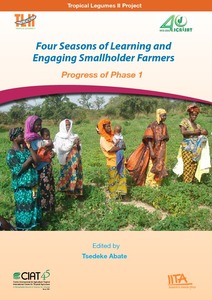Four Seasons of Learning and Engaging Smallholder Farmers: Progress of Phase 1.
Abstract
The Tropical Legumes II (TL II) project, funded by the Bill & Melinda Gates Foundation, aims to improve the lives and livelihoods of smallholder farmers in the drought-prone areas of Sub-Saharan Africa (SSA) and South Asia (SA) through improved productivity and production of six major tropical legumes – chickpea, common bean, cowpea, groundnut, pigeonpea and soybean. TL II is jointly implemented by ICRISAT, CIAT and NARS. The project was implemented in 10 target countries that included Western and Central Africa, Eastern and Southern Africa and India, during Phase 1 (Sept 2007 – Aug 2011). Progress made during this period was reviewed in 2011 at regional meetings held in ICRISAT-Patancheru, India (May 9-11 and Sept 5-6); Ibadan, Nigeria (16-18 May); and Lilongwe, Malawi (22-25 May). This paper presents highlights of progress made in the project during its first phase.
Conditions for tropical legumes production are highly variable among regions, countries, and even within a country in terms of socio-demographics, ownership of asset, information sources, technology adoption, and investment in AR4D. Many of the target countries are faced with small, fragmented landholdings; aging research and farming population; low level of literacy; and mostly low level of investment.
The participatory variety selection (PVS) approach has helped to speed up the release process of improved varieties. A total of 80 varieties of the six grain legumes have been released across target countries and nearly 93,000 MT of various classes of seed have been produced and used by smallholder farmers. The project has also supported 37 graduate students to pursue studies toward their advanced degrees (26 MSc and 11 PhD). Nearly 240,000 farmers have been exposed to new technologies through field days, demonstrations, seed fairs, and agricultural shows, among others.

